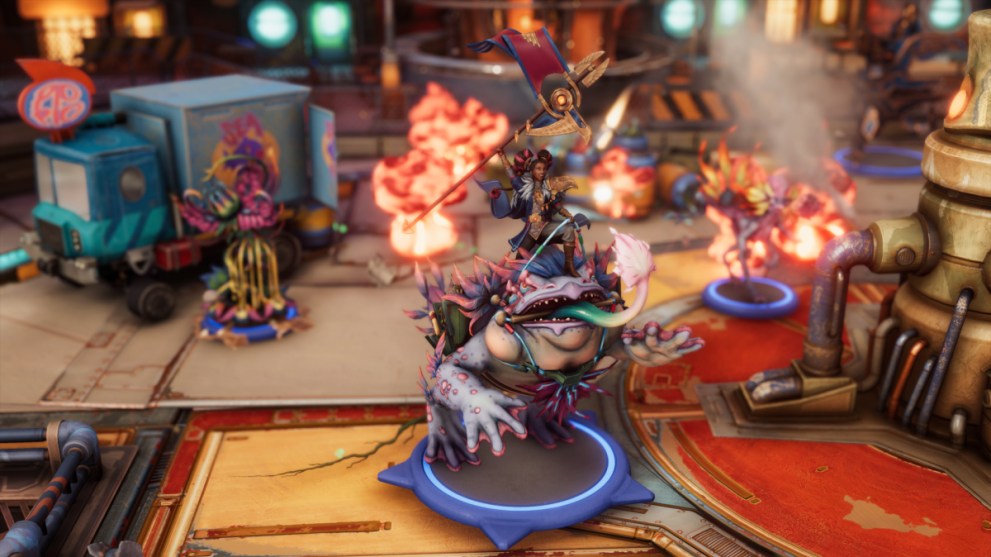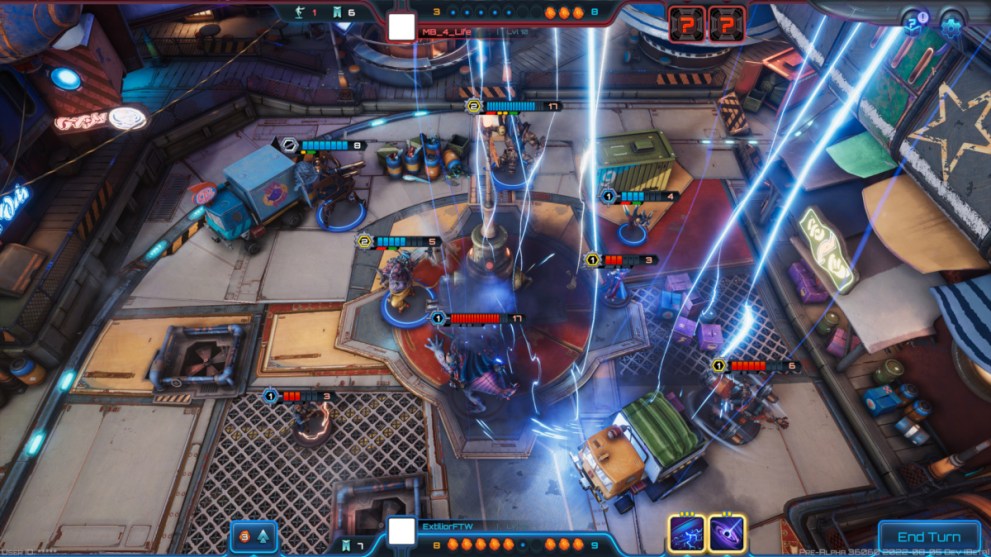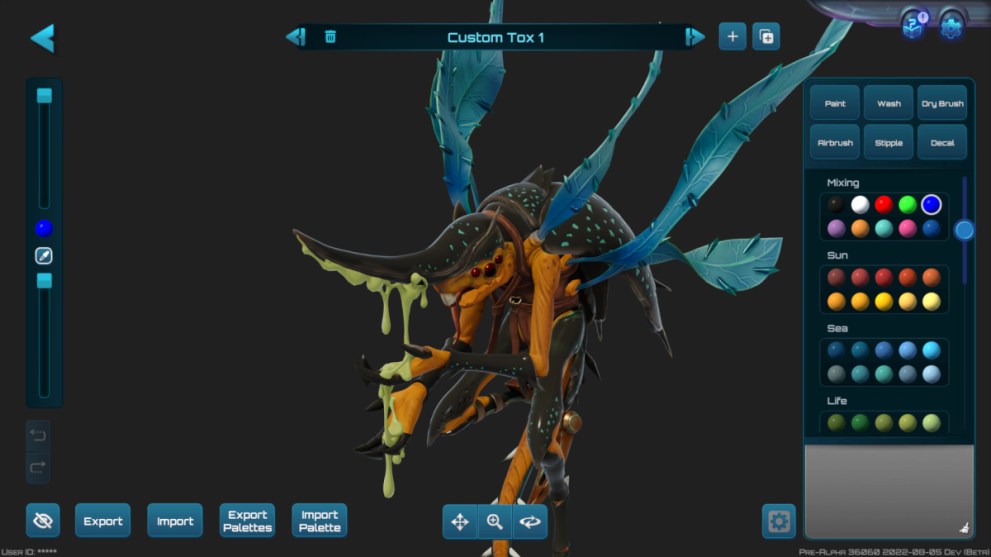Given the success and prominence of Subnautica, it’s no surprise that Unknown Worlds Entertainment would have high aspirations for its next project. After all, they had the funds, fan support, and the creative liberty to do whatever they’d like and to take it in whatever direction they saw fit. Regardless, few would have expected them to go with Moonbreaker, an ambitious turn-based strategy title that could rival Warhammer in its lore and creativity.
Starting off its development shortly after the completion of Subnautica, the game was and is a passion project for Unknown Worlds‘ founder Charlie Cleveland and technical director Max McGuire. The two shared a love for tabletop games and miniatures and wanted to create a video game that scratched the same itch as those two past times. The rest of the team at Unknown Worlds was quickly drawn into the idea, culminating in five years of development toward this idea and a brand new world surrounding it.
The end result is a game with the speed and graphical fidelity of a modern RTS but with the detailed lore and stylings of a clash of miniatures brought to life.
We were fortunate enough to get a first look at said world via a digital preview event, and that half-decade of development looks to have been well spent.

In a gameplay session led by community manager Donya Abramo, some of Moonbreaker’s combat was put on full display to kick things off. The game starts out like any other RTS, with players selecting a team of characters and units to work with during their match. Each team is led by a Captain character, Who is host to special abilities that can bolster the rest of one’s team and guide them toward certain strategies as the player sees fit.
The rest of the team is comprised of 10 units, which can range from melee-focused infantry to ranged units and beyond. The goal of any given match will be to reduce the opponent’s Captain character to 0 HP, after which they’ll be declared the winner.
Unknown Worlds plans to have three captains to choose from when the game hits early access later this year, and more are planned for release as the game moves toward its completed state and sees seasonal releases of new content. There will likewise be more expansions to the lore, with each tied to new factions or different facets of existing groups. Basic units will likewise be added as these new factions or groups are introduced.
Every unit will require an energy resource known as Cinder to be spawned in and to use abilities. Each ability and unit costs a different amount of Cinder as well, making it paramount to properly manage the use of this resource.
Likewise, units can be buffed or debuffed by both abilities tied to Captains or other units, by their being summoned into certain maps, or even by abilities tied to the ship they ride in on. Factoring all of this into combat will be integral to success and can greatly impact the variety of matches between players besides.
In a twist, though, the units look and move like actual real-life miniatures. Designed in great detail with the help of actual miniature makers and painters, they don’t have any articulation and move around as if someone were actually moving a miniature around a board during a tabletop game.
This honestly goes a long way in setting the game apart from its competition. Though it can be a little jarring at first, the image of highly-detailed miniatures moving around like game pieces is a novel one and lends itself well to the aesthetic Unknown Worlds is going for with Moonbreaker. It did feel like a tabletop game brought to life and left me feeling like I was meeting up with friends to be sucked into a pass time together.
The same can be said for the core gameplay mechanics. While everything presented was as in-depth as it sounded, it still ended up being more intuitive than one would expect. By the end of the explanation and seeing the setup for a battle, I felt confident I could at least prep for a game properly and begin to dig into its intricacies once I got my hands on the title in the future.

After selecting a team to work with, players are dropped into an arena where they can engage in battle with each other. By using Cinder, they can move units into combat with one another, firing off abilities that can be directed toward a specific target or hit anything within a certain area of effect. Once a unit is destroyed, it can’t be resurrected, so careful planning is paramount to success.
Likewise, knowing one’s environment is a key factor that can spell the difference between victory and defeat. Each map has a different theme and layout. Some are host to a central area that units will be funneled to for combat, while others might have more cramped sections that a select few units can duke it out in.
This, too, is an area where the game’s creativity really shines through. The environments hold a lively and authentic look to them, with brightly colored buildings and vehicles littered about or layers of red dust resting on metal structures. Like with the miniatures, they lend a feel of authenticity to the gameplay, sucking one further into the experience and bolstering the feel of this world existing and living separately from the player.
Following the end of the match, the preview then moved into customization options players will be able to enjoy with their units. Like real-life miniatures, every unit can be painted and customized to look however the player would like. If they want to paint every element of a unit’s jacket in a specific way and color, they can do so. If they’d like to dump buckets of pink or purple onto every part of the unit, they can do that too.
There are also a plethora of tools for applying detail and grouping colors to a specific part of a unit’s paint job, increasing the amount of detail one can put into a unit’s aesthetic and the ease with which one can do so substantially.
This may sound a little surface-level, but it was honestly one of my favorite parts of the preview. The sheer fact that so much time and love was put into this aspect shows how much Unknown Worlds care about this element and how they want players to have the best experience possible with their title.

To wrap up the preview event, Abramo then moved into an explanation of some of the game’s lore and the effort put into making it. Working with epic fantasy and science fiction author Brandon Sanderson, the team has meticulously laid out every aspect of the game’s world, lore, and characters.
This includes Cinder, which acts as the central driver of the plot. A limited resource throughout the universe, groups, and factions will go to great lengths to obtain the stuff. This includes battling for and digging into moons scattered throughout the universe which contain the material, and once these moons are depleted, they’re broken up and left floating in space. Hence, the game’s name.
The captains, in particular, have an insane amount of backstory to flesh out who they are and how they fit into the world. They’ll even have fully-acted audio dramas planned for release alongside them to give players a better idea of how they fit into Moonbreaker’s wider mythos.
This, too, speaks to how much Unknown Worlds cares about the world they’ve created and had me all the more eager to dive into it headlong.
Needless to say, Unknown Worlds are onto something big with Moonbreaker. It has the potential to be the next great RTS, and we’ll be eagerly awaiting its launch to Steam early access on Sept. 29, 2022.
